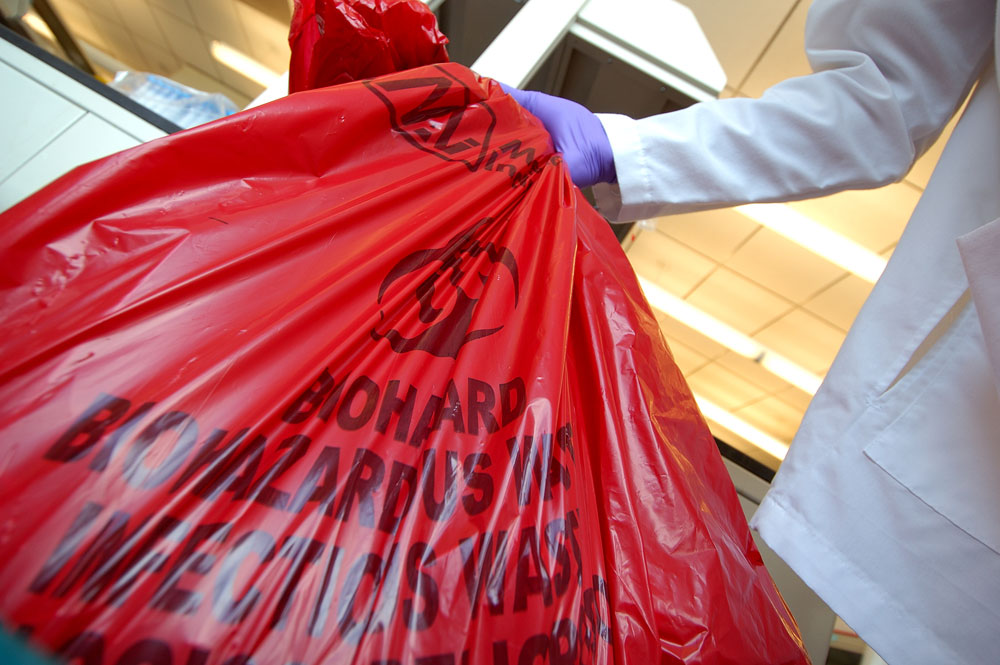How Are Biohazards Disposed Of?
 CONTENTS
CONTENTS
- What is biohazardous waste?
- How is biohazardous waste disposed of?
- Why only specialist cleaners should clean up biohazards
- Get in touch
Whether there are biohazards present at the scene of a crime that need to be cleaned up, or clinical waste has been produced at the hospital, the harmful substances need to be disposed of correctly. Disposal must be left to trained professionals to protect people's health and the environment.
At ICE Cleaning, our trauma cleaning services include the clean up of all biohazards and the disposal of biohazardous waste. Our trauma cleaners are fully qualified and have been accredited by the National Association of Crime Scene Cleaners. We operate nationwide, 24/7, 365 days.
Read on to find out more about biohazardous waste disposal.
What is biohazardous waste?
Biohazardous waste, also known as infectious or biomedical waste, poses a significant risk to public health and the environment. This type of waste contains potentially infectious materials that can spread diseases if mishandled.
Biohazardous waste usually comes from medical care in clinics and hospitals. It can even be produced in laboratories - for example, tissues swiped with infectious agents during research work at universities are biohazards.
Biohazardous waste is produced by trauma cleaners who clean up after incidents, crimes, and deaths where biohazards like blood, bodily fluids, needles, and other drug paraphernalia may be present, as well. You can find out more about the different kinds of biohazards here.
How is biohazardous waste disposed of?
Biohazardous waste requires meticulous handling to protect public health and the environment.
Initial segregation
The first step in disposing of biohazardous materials is segregating biohazards from regular waste. Items like needles, gloves soiled with bodily fluids, or laboratory cultures must be placed into special containers and bags which are sturdy and leak-proof. These designated bins ensure no accidental spills occur during collection or transit.
Inactivation methods
Inactivating pathogens within biohazardous waste is crucial before further processing can take place. This usually involves autoclaving which uses intense heat and pressure to render biological hazards harmless. Some facilities also use chemical disinfection when appropriate.
Packaging standards
Sterilised wastes then need careful packaging in line with regulations. These rules make sure everything stays contained until final disposal.
Treatment facilities and final disposal options
Specialist carriers then collect and transport the waste to specialised treatment facilities. Vehicles equipped specifically for carrying high-risk loads safely across distances without incident are required.
At these specialised treatment facilities, incineration stands out as a preferred technique. After treatment, if there is anything left over that can't be recycled or repurposed, like ash from incineration, it's sent off to a secure landfill site engineered specifically for hazardous wastes. Here the ashes are buried deep underground with measures taken to prevent the contamination of any soil and water sources around them.
Biohazard disposal is regulated heavily by environmental agencies and health authorities to protect nearby water sources and communities against potential pollution. There are lots of regulations regarding waste that must be followed, too, including the Environmental Protection Act 1990, Controlled Waste Regulations 2012, and Waste Regulations 2005.
Why only specialist cleaners should clean up biohazards
Cleaning up biohazards following a traumatic incident like a crime or death is a complex, dangerous, and often upsetting process.
Without the right personal protective equipment, you could be exposed to serious pathogens and will be putting your health at risk. An incorrect cleaning method may leave some pathogens behind, putting other people in danger in the future.
Specialist equipment and cleaning agents are required, too. Specialist cleaners use high-grade disinfectants approved by regulatory bodies which can eliminate all harmful substances and give you peace of mind the affected area is safe again. They will also be trained in biohazard waste disposal.
Trauma cleaners will understand how to follow regulations closely and minimise the risks of pollution or danger to public health. Their comprehensive service can give you peace of mind that the difficult situation is completely taken care of.
Trauma clean up can be a distressing experience, as well, particularly if you knew the victim. Specialist cleaners will be able to quickly restore the affected area to its previous condition while being sensitive and discrete.
Get in touch
If it's an emergency, our trauma cleaners can be on site within a matter of hours, wherever you are in the UK. They have many years of experience cleaning up a range of traumatic scenes including crime scenes, road traffic accidents, and unattended deaths.
To find out more about our trauma cleaning service, contact our team on 0208 066 0360 or send an email to enquiries@icecleaning.co.uk. They will schedule your free site survey and give you a no-obligation quote.

Speak with me today,
I’m here to help
By asking you a few questions either via phone or email I can immediately provide a realistic estimation of the cost.
You’re in good company. We’ve cleaned for the following commercial clients… View all

Why choose us?
- Cater to a wide variety of cleaning situations
- Nationwide coverage, available 24/7
- Cater to commercial and domestic clients
- Free survey provided prior to quotation
- Emergency response team
- Offer a bespoke service designed to suit all your needs
- All technicians hold professional health and safety qualifications, including BICSc, IOSH, Dewpoint Professional & Safe Contractor
We’re fully accredited
We place best practise, professional expertise and health and safety at the core of our business. We’re fully compliant with all legal obligations. You can view a list of our accreditations below, or visit our Health & Safety page for more information.











-RGB-small.1707319151.jpg)




















